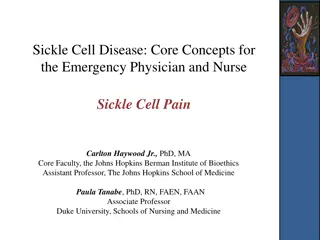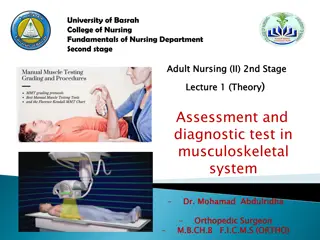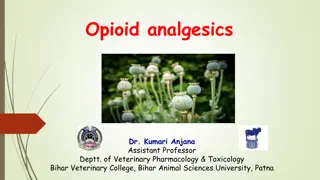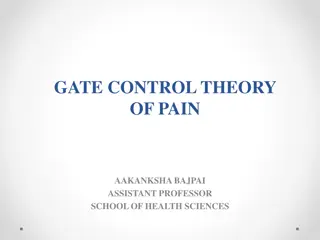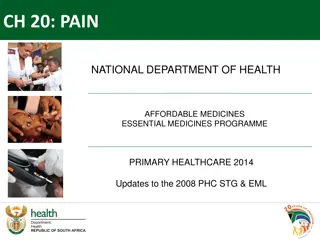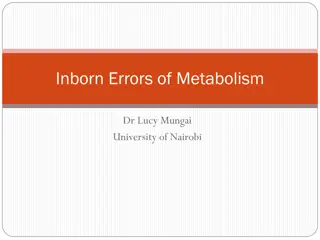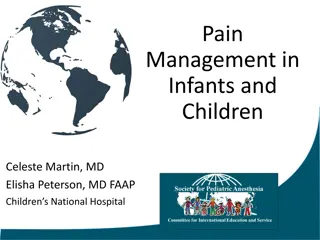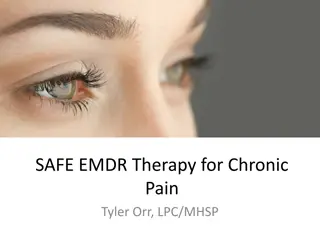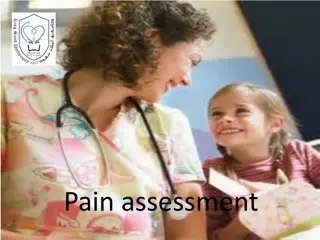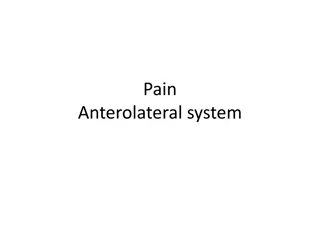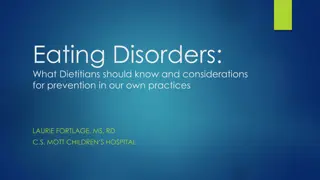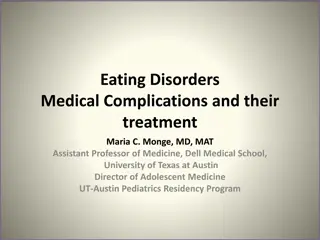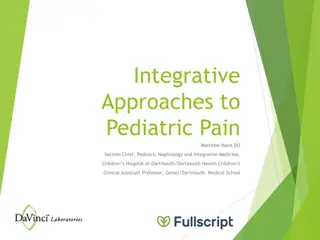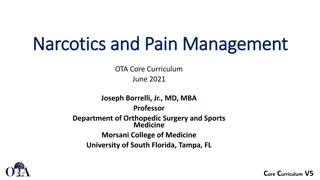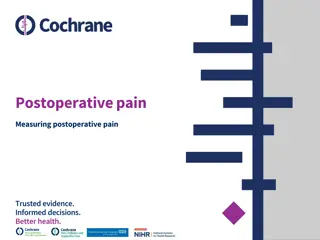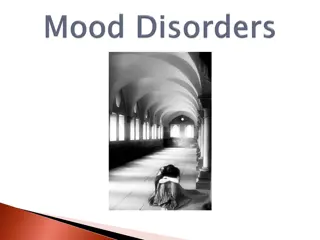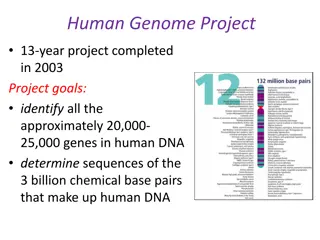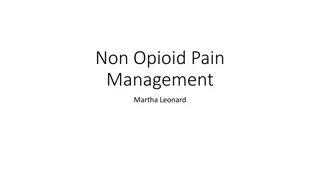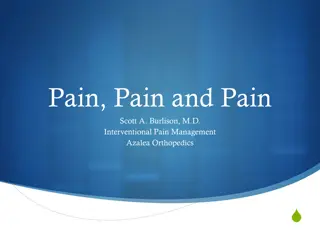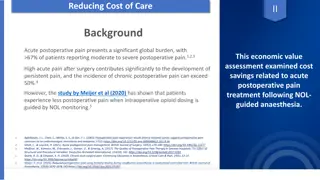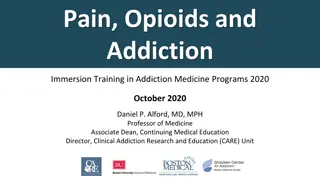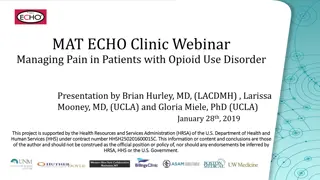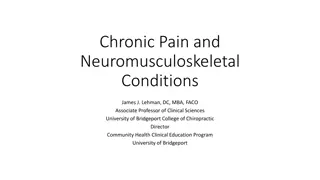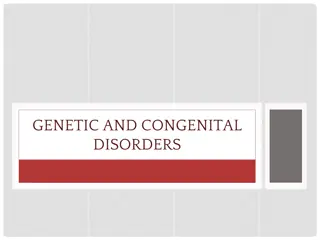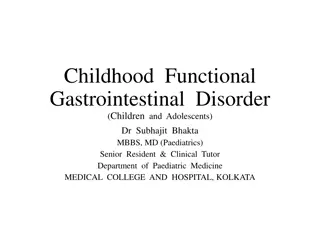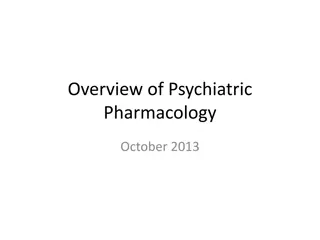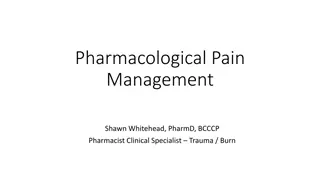Acute orofacial pain
Acute orofacial pain is often associated with dental issues, ranging from dentinal pain to periodontal pain. The pain can be moderate to severe, with various triggers such as mechanical stimulation and changes in osmotic pressure. This pain is prevalent in adults and can spread to different areas of
1 views • 49 slides
Understanding Sickle Cell Disease Pain Management
Sickle cell disease (SCD) patients often experience vaso-occlusive crises (VOC) causing acute pain, a hallmark symptom of the disease. Pain management is crucial in healthcare interactions for these patients, with chronic pain also being a significant concern due to organ/tissue damage. Research sho
1 views • 18 slides
Assessment and Diagnostic Tests in Musculoskeletal System Pain
Pain in musculoskeletal conditions varies, such as bone pain described as dull and deep, muscular pain as soreness, fracture pain as sharp, and joint pain worsens with movement. Specific assessments by nurses include checking body alignment, joint symmetry, signs of inflammation, pressure sources, a
7 views • 38 slides
Do you want relief from Neck Pain in South Brisbane
Do you want relief from Neck Pain in South Brisbane? Then contact Innervate Chiro. Their dedicated practitioners combine their experience in Chiropractic, Remedial & Sports Massage for fast effective relief of Back Pain, Neck Pain, Headaches, Vertigo, Sports Injuries, shoulder, hip, nerve pain, scia
0 views • 6 slides
Overview of Human Genetic Disorders
Human genetic disorders encompass a range of conditions, from recessive disorders like cystic fibrosis to dominant disorders such as Huntington's disease. Examples include cystic fibrosis, Huntington's disease, and sickle-cell anemia. Understanding genetic disorders involves research and awareness o
0 views • 10 slides
Overview of Anxiety and Related Disorders
Anxiety disorders, such as PTSD, panic disorders, phobias, agoraphobia, and OCD, are characterized by varying degrees of fear and distress. Anxiety is a normal response to danger, but when it becomes chronic, it can lead to debilitating conditions. PTSD occurs post-trauma, panic disorders involve in
1 views • 42 slides
Understanding Opioid and Non-Opioid Analgesics in Pain Management
Opioid analgesics, such as morphine, act in the central nervous system to relieve pain without affecting consciousness. They differ from non-opioid analgesics like aspirin in terms of CNS depression, pain type targeted, and addiction potential. Pain is a protective mechanism caused by tissue damage
0 views • 25 slides
Understanding Somatic Symptom Disorders, Conversion Disorders, and Dissociative Disorders
Somatic symptom disorders manifest as physical symptoms without apparent cause, while conversion disorders involve specific physical symptoms incompatible with medical conditions. Illness anxiety disorder involves interpreting normal sensations as disease symptoms. Dissociative disorders lead to a s
1 views • 41 slides
Understanding the Gate Control Theory of Pain in Pain Management
This detailed content delves into the Gate Control Theory of Pain, explaining pain pathways involving nociceptors, A-delta fibers, and C fibers. It further explores central pain pathways like the spinothalamic tract, spinomesencephalic tract, and spinoreticular tract. The theory's mechanism of pain
3 views • 11 slides
Update on Pain Management in Primary Healthcare
The updates to the 2014 Primary Healthcare Implementation Slides focus on pain control for children, including the addition of ibuprofen and exclusion of tramadol for moderate pain. The management of acute severe pain involves retaining morphine injection while omitting metocloperamide, paracetamol,
0 views • 10 slides
Understanding Inborn Errors of Metabolism and Metabolic Disorders
Inborn Errors of Metabolism (IEM) are genetic disorders that disrupt metabolic pathways, leading to substrate accumulation or product deficiency. These disorders can be classified based on toxic accumulation, protein metabolism, carbohydrate intolerance, lysosomal storage issues, energy production d
0 views • 29 slides
Understanding Pediatric Pain Management
Explore the complexities of managing pain in infants and children, including defining pain, classifying different types of pain, understanding pain assessment tools, identifying medication classes for treatment, and recognizing special considerations. Discover insights on acute and chronic pain, neu
1 views • 40 slides
Understanding the Brain: Key Insights on Chronic Pain and EMDR Therapy
Persistent pain is often a symptom originating from the brain, not the body tissues. EMDR therapy can help reprocess maladaptive memory networks linked to chronic pain, addressing root causes including adverse childhood experiences. The AIP model emphasizes early-life factors in shaping chronic pain
0 views • 28 slides
Understanding Co-occurring Mental and Physical Health Conditions
Co-occurring mental and physical health disorders are prevalent and require an integrative multidisciplinary approach for effective assessment and treatment. This holistic approach helps address the complexity of managing multiple disorders in an integrated healthcare setting. Through a multi-direct
1 views • 37 slides
Understanding Pain Assessment: Factors, Tools, and Relief
Pain assessment is crucial for understanding and managing patients' pain perception. This involves identifying different forms of pain, factors affecting pain sensitivity, behavioral responses to pain, and utilizing pain assessment tools for accurate evaluation. Factors influencing pain sensitivity
0 views • 18 slides
Understanding Pain: Mechanisms and Pathways
This content delves into the intricate mechanisms of pain perception, exploring the anterolateral system, nociceptors, endogenous analgesic systems, and more. It covers topics such as free nerve endings, VR1/Capsaicin receptors, referred pain, neuropathic pain, hyperalgesia, and visceral pain. The m
0 views • 15 slides
Understanding Functional GI Disorders: A Comprehensive Overview
Functional GI disorders encompass a range of conditions affecting the gastrointestinal system, such as irritable bowel syndrome and disorders of the gut-brain interaction. These disorders are characterized by no structural abnormalities but are influenced by factors like motility disturbance, viscer
0 views • 42 slides
Understanding Genetic Disorders and Their Impact on Health
Genetic disorders are caused by abnormalities in genes or chromosomes, leading to various health conditions. Inherited disorders can be passed down from parents to children, affecting physical makeup and processes in the body. In India, there is a high prevalence of genetic disorders, particularly i
1 views • 12 slides
Understanding Eating Disorders: Types, Signs, Effects, and Recovery
Eating disorders are mental disorders characterized by unhealthy eating habits and can have severe physical and psychological consequences. This article explores the definition of eating disorders, signs to look out for, different types such as Anorexia Nervosa, Bulimia Nervosa, Pica, and Purging Di
0 views • 10 slides
Understanding Eating Disorders: Insights for Dietitians
Eating disorders are complex neurobiological conditions that are not merely about control or weight management. These disorders can affect individuals of all genders, body sizes, and socioeconomic backgrounds. Dietitians play a crucial role in identifying, assessing, and treating eating disorders, a
0 views • 41 slides
Understanding Eating Disorders: Medical Complications and Treatment
This presentation by Dr. Maria C. Monge covers the common eating disorders in teenage patients, potential medical complications, and the role of the medical team in treatment. It includes definitions of disorders like Anorexia Nervosa, Bulimia Nervosa, and Binge Eating Disorder according to DSM-5 cr
0 views • 60 slides
Integrative Approaches to Pediatric Pain Management: A Comprehensive Review
Pediatric pain management is a complex issue involving factors such as inflammation, neuroplasticity, and emotional responses. Dr. Matthew Hand explores integrative approaches to address common pediatric pain conditions and highlights the prevalence of chronic pain in children. The presentation delv
0 views • 39 slides
Understanding Pain Management in Orthopedic Surgery
Pain management in orthopedic surgery involves reviewing pain pathways, mitigating pain transmission, understanding pain medications, and implementing multi-modal pain relief strategies. Pain is a complex and subjective experience with sensory, affective, emotional, and cognitive dimensions. Factors
0 views • 51 slides
Understanding Neurodevelopmental Disorders in Childhood and Adolescence
Neurodevelopmental disorders in childhood and adolescence encompass a range of conditions including intellectual disabilities, communication disorders, autism spectrum disorder, and attention deficit/hyperactivity disorder. These disorders impact cognitive development, adaptive functioning, and comm
0 views • 30 slides
Understanding Sleep Disorders: Classification and Diagnosis
Sleep disorders encompass various conditions affecting sleep patterns and quality. They are classified into categories such as insomnia, sleep-related breathing disorders, central disorders of hypersomnolence, circadian rhythm sleep-wake disorders, parasomnias, and sleep-related movement disorders.
0 views • 32 slides
Understanding Postoperative Pain Measurement Methods
Standard methods for measuring postoperative pain include categorical, visual analogue, and numerical rating scales. Patients should self-assess their pain using these tools for accurate reporting, as demonstrated by research on pain congruence between patients and nurses. Enhancing understanding of
0 views • 16 slides
Understanding Grief and Depressive Disorders: A Comparative Analysis
Grief and depressive disorders share similarities but also have distinct differences. Grief is a universal emotional state following loss, while depressive disorders involve prolonged mood disturbances. The stages of grief include denial, anger, bargaining, depression, and acceptance, with intervent
0 views • 79 slides
Understanding Genetic Disorders and the Human Genome Project
The Human Genome Project, completed in 2003, aimed to identify all human genes and DNA sequences. Genetic disorders, like autosomal disorders and Huntington's disease, can result from mutations at different levels, affecting single genes, chromosomes, or multiple genes. Albinism and cystic fibrosis
0 views • 37 slides
Understanding Non-Opioid Pain Management Strategies
Non-opioid pain management is crucial in the current opioid epidemic, requiring physicians to navigate chronic pain without relying on opioids. This comprehensive approach involves a deep understanding of non-opioid analgesic medications, the nature of pain, anatomy, and physiology of nociception, t
0 views • 36 slides
Understanding Abnormal Psychology: Disorders, Symptoms, and Treatments
Explore the world of abnormal psychology through the lens of different disorders like depression, anxiety, and phobias. Learn about the definitions of abnormal behavior, DSM-V classifications, and various types of psychological disorders. Delve into the complexities of mental health conditions such
0 views • 39 slides
Understanding Pain Management: Acute vs. Chronic Pain and Interventional Therapies
Pain is a complex experience that can be acute or chronic, requiring different treatment approaches. Acute pain alerts us to potential injury, while chronic pain lasts longer and affects quality of life. Management options range from medical and psychological treatments to advanced interventions and
0 views • 26 slides
Cost Savings in Postoperative Pain Management with NOL-Guided Anesthesia
Acute postoperative pain is a significant issue globally, with high prevalence rates and potential long-term consequences. This economic assessment explores cost savings associated with using NOL-guided anesthesia to optimize postoperative pain treatment. By categorizing postoperative pain scores an
0 views • 4 slides
Understanding Chronic Pain, Opioids, and Addiction in Medicine
Chronic pain is a complex issue that can impact individuals on various levels. It is important to understand the subjective nature of pain and the barriers to adequate pain care. Opioid analgesics, while effective in managing pain, come with risks such as side effects, addiction, and overdose potent
0 views • 28 slides
Managing Pain in Patients with Opioid Use Disorder: Strategies and Approaches
This presentation discusses essential factors to consider when treating pain in patients with Substance Use Disorder (SUD), including approaches for acute pain in those on Medication-Assisted Treatment (MAT) and non-opioid therapies for chronic pain. The information covers altered pain experiences i
0 views • 26 slides
Overview of Classification of Psychiatric Disorders
Psychiatric disorders are illnesses with various manifestations that impact functioning due to disturbances in biological, social, genetic, and other factors. Two key classification systems, ICD-10 and DSM-5, categorize over 200 types of psychiatric illnesses. The ICD-10 includes categories like org
0 views • 18 slides
Understanding Chronic Pain: A Comprehensive Overview
Chronic pain and neuromusculoskeletal conditions are prevalent health issues that require a specialized approach for accurate diagnosis and treatment. This content delves into learning objectives, national pain strategies, and the significance of addressing persistent pain as a chronic illness that
0 views • 80 slides
Overview of Genetic and Congenital Disorders and Their Causes
Explore the terminology, causes, characteristics, and results of genetic and congenital disorders, as well as the disorders of single-gene inheritance. Learn about autosomal dominant disorders like Marfan Syndrome and Neurofibromatosis. Discover how single-gene disorders are inherited and their impa
0 views • 24 slides
Understanding Childhood Functional Gastrointestinal Disorders
Functional Gastrointestinal Disorders (FGIDs) in children and adolescents are characterized by chronic or recurring symptoms that cannot be fully explained by current structural or biochemical tests. These disorders emphasize the role of normal development in symptom presentation and the lack of evi
0 views • 46 slides
Overview of Psychiatric Pharmacology: A Comprehensive Guide from 2013
This presentation delves into the nuances of psychiatric pharmacology, exploring common psychiatric conditions, historical perspectives on medical treatments, categories of psychiatric medications, and principles of treatment. It also touches on mental illness definitions from DSM-IV-TR and DSM-V, a
0 views • 27 slides
Comprehensive Overview of Pharmacological Pain Management Strategies
This comprehensive overview covers various aspects of pharmacological pain management, including behavioral measures for patients unable to self-report pain, building pain regimens, NSAIDs use and associated risks, NSAIDs and COX selectivity, clinical presentation of pain symptoms, gabapentinoids fo
0 views • 22 slides

